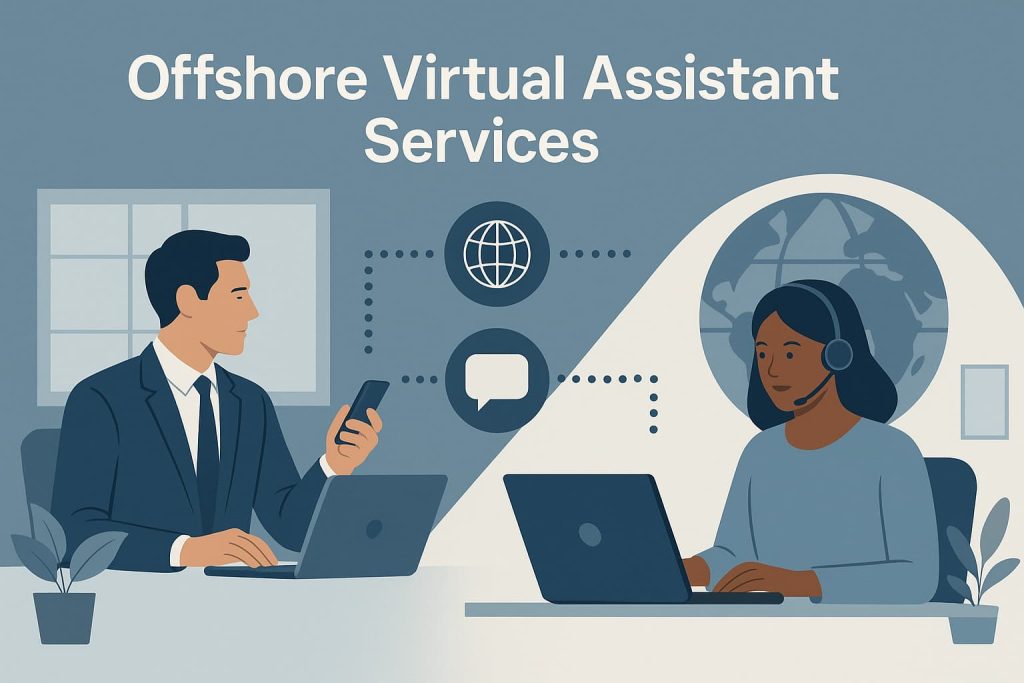The demand for offshore virtual assistant services has grown rapidly as businesses look for smarter, more cost-effective ways to stay productive. From inbox management and customer support to content scheduling and bookkeeping, offshore VAs have become a global solution for leaders who want expert help without local overhead.
But like any outsourcing decision, there’s more to it than cost savings. Time zones, communication styles, and data security all play a role in determining whether hiring offshore is a good move for your business.
This article explores the pros and cons of offshore virtual assistant services and shares practical tips to help you build a reliable, long-term partnership with your remote team.
The Pros of Offshore Virtual Assistant Services
Hiring an offshore virtual assistant can unlock new levels of flexibility and efficiency. For many startups and growing companies, it’s a strategic move that balances budget with talent.
1. Cost Efficiency
The most obvious advantage is cost. Offshore VAs often work at lower hourly rates compared to local assistants, especially in regions with favorable currency exchange rates. This allows business owners to reinvest those savings into growth, marketing, or product development.
2. Access to Global Talent
Going offshore opens your hiring pool to skilled professionals worldwide. Whether you need administrative support, lead generation, or technical assistance, you can find specialists in nearly every industry.
3. 24/7 Productivity
With time zone differences, your business can operate around the clock. While you rest, your offshore VA can be processing orders, handling client messages, or preparing reports for the next day.
4. Scalability
You can scale your team quickly without worrying about workspace, equipment, or full-time employment costs. Offshore virtual assistants can be hired for specific projects, part-time tasks, or long-term roles, depending on your needs.
The Cons of Offshore Virtual Assistant Services
While offshore virtual assistant services offer impressive advantages, they also come with challenges that every business should consider before hiring.
1. Communication Barriers
Language differences and varying communication styles can cause misunderstandings, especially when giving detailed instructions or handling time-sensitive tasks. Clear, written communication and visual guides (like Loom videos) can help bridge that gap.
2. Time Zone Differences
Time zones can work for or against you. While some overlap is useful for collaboration, significant time gaps can delay responses or limit live meetings. The key is to establish consistent check-in times and clear expectations.
3. Data Privacy and Security
When sharing sensitive business information, data protection becomes a concern. Using secure password managers, encrypted communication tools, and clear confidentiality agreements can minimize risk.
4. Cultural Differences
Every region approaches work differently. Differences in tone, initiative, or hierarchy can affect how tasks are managed. Successful leaders take time to understand these cultural nuances and adapt their management approach accordingly.
Best Practices for Working with Offshore VAs
Building a strong relationship with an offshore virtual assistant requires intention, clarity, and trust. Here’s how to make the partnership successful from day one.
1. Start with Clear Expectations
Before assigning tasks, outline responsibilities, preferred tools, communication channels, and deadlines. A shared document or onboarding guide can help create structure from the start.
2. Use the Right Tools
Project management and collaboration platforms like Trello, Asana, or ClickUp keep everyone aligned. Combine them with communication tools like Slack or Zoom to maintain a sense of connection.
3. Schedule Overlapping Hours
Even a one- or two-hour daily overlap can make a huge difference. Use this time for check-ins, progress reviews, or brainstorming sessions.
4. Prioritize Feedback
Offshore VAs often work across multiple clients and cultures. Regular, constructive feedback helps them understand your expectations and maintain consistent quality.
5. Protect Data and Confidentiality
Use tools like LastPass, 1Password, or Google Workspace for secure access management. Always include NDAs in your contracts and limit permissions to only what’s necessary.
Making Offshore Work Work for You
Offshore virtual assistant services can be a game-changer when approached with strategy and structure. The real value lies in more than just saving money; it’s about extending your team’s capabilities, improving efficiency, and freeing yourself to focus on leadership and growth.
The key to success is partnership. Treat your offshore VA as part of your business, not just a task-taker. Communicate clearly, offer feedback, and invest in tools that make collaboration easy.
When you approach outsourcing with respect and systems, distance becomes irrelevant. What matters is the trust you build, the clarity you maintain, and the consistency that turns a good VA into an exceptional one. Ready to explore offshore virtual assistant support for your business? Let’s chat.

